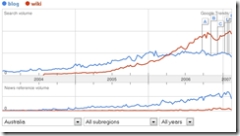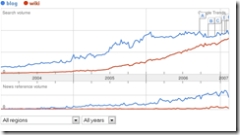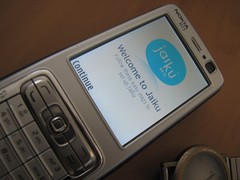Home » Ponderings (Page 7)
Category Archives: Ponderings
Married!
On Saturday, Emily and I officially tied the knot! It was a magical day, with love all around us, complemented by blue skies, a shining sun, and the warmth of some amazing friends and family. The first few pictures have made their way onto Flickr here if you fancy a glimpse of our wonderful day!
As you might imagine, Emily and I are off to enjoy some quality time together, so I will be completely out of touch – no email, no blogging, no Flickr, no Facebook – until we return on June 25th. This also means any comments left here that require approval (which all comments from first-time posters do) won’t be confirmed until then either (please don’t be offended by the delay).
In the meantime, have fun, and maybe watch In Media Res around June 18th for something that’ll get your Spider-Senses tingling!
Upgrades, Deletions, Apologies … and a Little Anger
 Visitors to this blog may have noticed many things broken or not got anything but a 404 for the last 12 hours. My apologies – most is now fixed, but let me explain. Last night, about 5 minutes before I went to bed, I got this email:
Visitors to this blog may have noticed many things broken or not got anything but a 404 for the last 12 hours. My apologies – most is now fixed, but let me explain. Last night, about 5 minutes before I went to bed, I got this email:
from: “support@secureserver.net” <support@secureserver.net>
subject: Update [Incident ID: 2110748] – Information Regarding Your Account for tamaleaver.netSupport Staff Response
Dear Sir/Madam,
It has come to our attention that your tamaleaver.net hosting account is running a vulnerable version of wordpress. This has caused an attacker to upload malicious content to your hosting account. We have removed the malicious content and have disabled the vulnerable script.
To prevent further attacks, we request that you update your version of wordpress as soon as possible. We appreciate your cooperation in this matter.
Please let us know if we can be of further assistance.
Regards,
Advanced Hosting Support
I was a little surprised since I was running 2.1.3 which, to the best of my knowledge, was fine (and I was not running the buggy 2.1.1). However, I figured I’d check in the morning what had been deleted – I presumed a script that wasn’t part of the standard WordPress world, so that was fine. However, to my horror this morning when I checked, I found that “support” (and I use the term very broadly) had done at least two things: deleted my entire wp-admin directory, and deleted a number of image files (the reason for which I can’t even begin to fathom). As a result, this blog has been rather stuffed for the last 12 hours. Since it was broken anyway, I’ve now upgraded to WordPress 2.2 and got almost everything back and running. However, a month’s worth of uploaded images were deleted, and I’ve not backed up since the end of April, so they can’t be recovered (thus, if you find a blog post with an image missing … primarily from posts in May 2007, this is why; I’ll try and replace them at a later stage.)
So, sorry for the downtime, if I had any control over it I’d promise it wouldn’t happen again! That said, the support folk at secureserver (whom GoDaddy use) will be getting a rather frank email about the over-deletion of my files, and, more to the point, a request to exactly what they think happened since I’ve seen no evidence myself of any malicious content.
Searching Blogs Vs Wikis – Australians Prefer Wiki (The World Prefers Blog)
I was playing with Google Trends and their comparison function and noticed that you can now limit searches to regions (ie just Australia, for example). I was playing around looking at the comparative popularity of ‘blog’ versus ‘wiki’ and found something interesting: cumulatively, global searchers are still typing in ‘blog’ more, but in Australia, ‘wiki’ is a more popular term, and has been since the third quarter of 2006. Since there’s no scale on Google Trends, I’ve no numbers attached to these trends, but the results are interesting nevertheless.
Australia is looking for wikis…
While the world is looking for blogs…
[Click either image to expand.]
I’ve no idea why wikis are more popular in Australia … perhaps something to do with Wikipedia? I note in the News trends (the smaller bottom graph), blogs are still mentioned a lot more in the mainstream media. I wonder what it is about wikis and Aussies?
The Value of Slideshare
Slideshare – the YouTube of powerpoint – has been around for a while now, but I’ve always wondered in slides, by themselves, are all that valuable as a teaching and learning tool. Of course, if I’d been thinking like Steve Jobs’ catchphrase “think different” I’d have soon realised that the best slides online are those which are purpose written for that context.
Today, browing Slideshare, I came across this breakdown of Pleasantville using slides:
Apparently the author – mcmrbt – uses these slides in teaching high school students. My first reaction was to think I really wished my high school media classes had been like this! Secondly, though, I think I’ve now seen how Slideshare can be used well – as an online resource which complements other classroom teaching, not slides which were used in snyc with a face to face presentation.
Six Twitter Questions
Last week danah boyd posted a few questions about Twitter use. Since I answered each one in my head, I figure I’d post my answers here on the (very off) chance someone else is interested in my answers. danah’s questions are in italics …
First, the practical question. Can i quote you?
[X] Yes, and you *must* use my real name.
1. Why do you use Twitter? What do you like/dislike about it?
I love the immediacy of Twitter. I also like the fact that since Tweets are so small, people often write more personal things, letting you – over time – build a more holistic sense of them as a person not just as an academic (or whatever role that person has as their more careful public face, the face that is often more carefully maintained through other forms, such as blogging).
I don’t like the fact that, so often, I turn to Twitter only when I’m trying to procrastinate or distract myself from what I should “really” be doing!
2. Who do you think is reading your Tweets? Is this the audience you want? Why/why not? Tell me anything you think of relating to the audience for your Tweets.
I’ve got two discernable groups – firstly, Perth folks who Twitter and who knowingly form a sort of semi-web2.0 ensemble (the same folk you’d see at Perth Blog Meetups); secondly my academic and pseudo-academic ‘friends’ (and I use the quote marks since I’ve not physically met a number of the people I’d imagine in this category) who I share some interests with – be it digital culture, film, participatory culture or some combination thereof. These are both the people I imagine are reading me (or have subscribed to my Tweets) and also the people I read.
3. How do you read others’ Tweets? Do you read all of them? Who do you read/not read and why? Do you know them all?
As at 2. The only time I read new Tweets, now, is when someone I’m already reading either points to someone/something interesting or is engaged in one side of an interesting conversation and I want to hear the other half!
4. What content do you think is appropriate for a Tweet? What is inappropriate? Have you ever found yourself wanting to Tweet and then deciding against it? Why?
Inappropriate is a hard call – I’ve seen all sorts of colourful language and that seems in keeping with the immediacy and personal aspects of Twitter, but at the same time I wonder if those, aggregated, would be the sort of thing people want to be a reflection of themselves. I guess links to porn or other potentially offensive material has to be flagged as such – the use of TinyURLs means you’re less able to predict the contents of a link by it’s URL and so the onus (I think) is on the Twitterer to make it clear what they’ve linking to.
5. Are your Tweets public? Why/why not? How do you feel about people you don’t know coming across them? What about people you do know?
Mine are at present. I’m considering making them private as I’ve caught myself (only once so far) writing and then deleting a Tweet since it was venting about the workplace and the workplace could – at some distant point in the future – notice. That said, I’m never really sure how private ‘private’ turns out to be.
6. What do i need to know about why Twitter is/is not working for you or your friends?
Twitter, to me, works best in tandem with other forms. Most of the Twitterers and Twitterati I read are already bloggers, but their Tweets add a level of personality and personal depth which often isn’t visible in their blog posts (which are often more careful, especially because blogs and ‘personal profiles’ so often are synonymous in academia).
I Jaikued today … I don’t think I shall again.
I tried Jaiku today since it’s been discussed a lot recently as the ‘other’ Twitter (even though Jaiku was around first, I think).
First impressions of Jaiku – a lot more tools, more fleshed out, I like the idea of comment threads on individual messages, it’s less about popularity per se, and more about a small tight-knit group (I think). The recent explosion of interest and use of Twitter seems to have people trying Jaiku as well, but from my few hours of use, the massive influx of users has left Jaiku with more speed problems than Twitter’s recent scaling and capacity issues.
However, the appeal of Twitter for me is its simplicity … it has very few tools and the posts (Twits) are primarily self-contained. The ‘@’ reponding has evolved socially, but I don’t imagine it’ll grow to get all that complicated.
More to the point, for me, Twitter is a sometimes food and I like my procrastination (or ‘continual partial prescence’ if you must) simple and no fuss.




